Carbon Credit Trading
Marketplace Development
Launch your own Carbon Credits Trading Platform with our expert development services. We create secure, transparent, and blockchain-powered solutions to streamline carbon credit transactions. Empower sustainability with cutting-edge technology!
Empower Sustainability with a Next-Gen Carbon Credits Trading Platform Development Services
The growing worldwide interest in carbon neutrality and climate action has resulted in the emergence of carbon credit trading platforms, through which organizations and individuals can cancel out their carbon footprint. With our expertise as a top-ranked Carbon Credits Trading Platform Development Company, we establish safe, secure, and transparent blockchain-based platforms that support the smooth trading of carbon credits and maintain environmental regulations and standards compliance.
What is Carbon Footprint?
Carbon Footprint is the total amount of Carbon waste or gas that is produced by an individual, organization or community that is added to the atmosphere, usually expressed in equivalent tons of carbon dioxide (CO2). This Carbon Footprint Emison also includes greenhouse gases like methane, chlorofluorocarbons (CFCs) etc. Individuals, companies, or organizations can calculate their carbon emissions by Carbon footprint calculation .
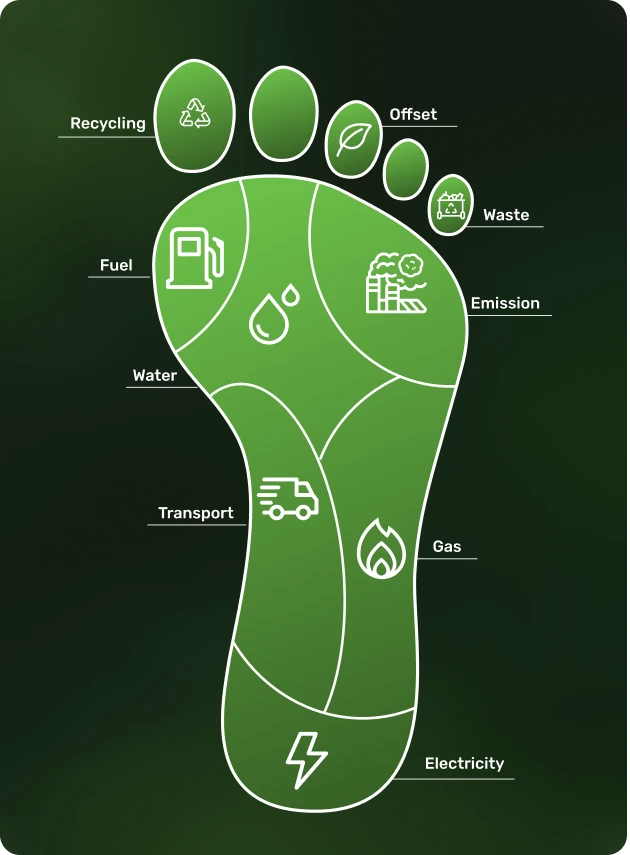
These are emissions that result from activities of individuals that we can directly control or reduce, and these emissions are majorly from driving a car, heating a home, or using electricity.
These are emissions that result from the production of goods and services that we consume, but do not directly control. And these emissions are majorly produced during the manufacturing and transportation of a product we purchase etc.
What is Carbon Footprint Calculation?
Carbon footprint calculation is the process of measuring the total amount of greenhouse gases (GHGs) produced by an individual, organization, or community, usually expressed in equivalent tons of carbon dioxide (CO2).
Calculating a carbon footprint includes adding up all the emissions associated with the activities and products that an individual, organization, or community uses. These calculations can be done using carbon footprint calculators. This can help to identify the main sources of emissions and potential areas for carbon reduction.
Calculate your Carbon Footprint within seconds
What is Carbon Credit?
A carbon credit is a unit of measurement for carbon dioxide emission or other greenhouse gas emissions that can be traded in markets with Regulations It represents one tone of CO2e that an organization is permitted to emit.
Carbon credits are created by the governing organization and allocated to individual companies within their jurisdiction, representing their emissions limit. If a company emits less than its limit, it can sell the excess credits to another company that has exceeded its carbon emission limit.

What is a Carbon Credits Trading Platform?
The Carbon Credits Trading Platform is an online platform on which businesses and individuals can buy, sell, and trade carbon credits. They are a license to emit a specified quantity of carbon dioxide (CO2) or other greenhouse gases (GHG). Businesses cutting emissions can sell surplus carbon credits to those over their targets, fostering sustainability and compliance with regulations.
Key Features of Our Carbon Credits Trading Platform
Blockchain Integration
Provides immutability, transparency, and security to carbon credit transactions.
Smart Contracts
Automate trading operations, minimizing manual intervention and ensuring equitable pricing.
Tokenization of Carbon Credits
Tokenize carbon credits as digital assets (NFTs or tokens) for hassle-free on-chain trading.
Multi-Asset Support
Trade carbon credits of various categories, such as Certified Emission Reductions (CERs), Verified Carbon Units (VCUs), and Renewable Energy Certificates (RECs).
Regulatory Compliance
In-built compliance with international carbon market standards such as Kyoto Protocol, Paris Agreement, and EU Emission Trading System (ETS).
Real-Time Analytics & Reporting
Monitor carbon credit prices, transactions, and environmental impact.
Secure Digital Wallet
Facilitate secure storage and easy transfer of carbon credits.
User-Friendly Dashboard
An easy-to-use interface for buyers, sellers, and regulators to view market data and transactions.
Unlock the Future of Carbon Trading
Tokenize your carbon credits with blockchain technology for seamless, transparent, and secure trading.
Explosive Growth Predicted for Carbon Credit Trading
change and increased corporate commitments to sustainability
-
Market Size
Around $150–170 million in 2025. -
Growth Rate
Expected CAGR of 17–23% over the next few years. -
Key Regions
Europe leads with 40% market share; North America is growing quickly too. -
Drivers
Strong climate policies, corporate sustainability goals, and government support.
End-to-End Carbon Credit Trading Platform Services We Offer
Carbon Credit Marketplace Setup
We build secure, easy-to-use platforms for trading carbon credits. Our marketplaces support real-time pricing, multi-currency trades, and robust security.
Tokenization of Carbon Credits
Digitize your carbon credits into blockchain tokens for better transparency, traceability, and faster trading.
Smart Contract Development
We develop smart contracts that automate trades, ensuring secure, transparent, and efficient transactions.
Verification and Certification Support
Get support for verifying and certifying carbon credits to meet global standards like Verra and Gold Standard.
Custom Dashboard Development
Track trades, prices, and emissions data with customized dashboards designed for real-time insights and reporting.
Compliance and Regulatory Consulting
Our experts help you meet all regional and international carbon trading regulations and compliance requirements.
API Integration
We integrate APIs to connect your platform with registries, exchanges, payment systems, and real-time data sources.
Ongoing Technical Support
Receive continuous maintenance, security updates, and feature upgrades to keep your platform running at its best.
How Our Carbon Credits Trading Platform Works
User Sign-up & Verification
Companies and individuals register and go through KYC/AML verification.
Sellers list carbon credits as virtual assets (tokens/NFTs) on the platform.
AI-driven order-matching system enables equitable trades.
Trades are executed automatically through secure smart contracts.
Users safely store, purchase, and transfer carbon credits.
Real-time reporting for regulators and companies to monitor carbon footprints.
Benefits of Building a Carbon Credits Trading Platform
The Carbon Credits Trading Platform is an online platform on which businesses and individuals can buy, sell, and trade carbon credits. They are a license to emit a specified quantity of carbon dioxide (CO2) or other greenhouse gases (GHG). Businesses cutting emissions can sell surplus carbon credits to those over their targets, fostering sustainability and compliance with regulations.
User Features
-
Sustainability-driven:
This encourages enterprises to invest in projects aimed at decreasing carbon emissions. -
Transparency-enhanced:
The blockchain ensures carbon credit transaction records are immutable. -
Extended market access:
Facilitates trust on sales and purchases of carbon credits across the globe with only a few third parties in between. -
Generate revenue:
Trading fees, commissions, and premium services are offered on the marketplace. -
Automated and secure:
Smart contracts eliminate completely the chance of fraud while assuring fast transactions.
Get Your Carbon Credit Platform at the Right Price
Our cost-effective solutions bring your carbon credit platform to life without compromising quality.
Carbon Credit Accreditations
Carbon credit accreditation is an accreditation program that verifies and certifies a carbon project’s compliance with GHG (greenhouse gas) crediting standards and requirements. Accreditation is carried out by accredited organizations and is applicable to both compliance and voluntary carbon trading markets.
Top Carbon Accredited Organizations
The most widely recognized carbon credit certification programs include
VEERA (VCS)
The VCS certifies carbon credits to offset emissions, with one Verified Carbon Units (VCU) representing one metric tonne of carbon dioxide reduced or removed.
Gold Standard
It was developed by the Gold Standard Foundation, a non-profit organization, to ensure that carbon offset projects not only reduce or remove greenhouse gas emissions but also deliver additional sustainable development benefits.
Climate Action Reserve (CAR)
It is the premier carbon offset registry in North America. The Reserve guides the development of project protocols for quantifying and verifying GHG emissions reduction projects. It provides oversight to independent third-party verification bodies, and issues and tracks carbon credits, called Climate Reserve Tonnes (CRTs).
American Carbon Registry (ACR)
ACR provides rigorous standards and protocols for carbon offset projects, ensuring credibility and accountability in the marketplace while facilitating the transition to a low-carbon economy.
UNFCC - (CDM)
The United Nations Framework Convention on Climate Change (UNFCCC) established the Clean Development Mechanism (CDM) as a flexible market-based mechanism under the Kyoto Protocol. It aims to assist developing countries in achieving sustainable development while also contributing to global emissions reduction efforts.
Essential Components of a Blockchain Carbon Credit Ecosystem
Tokenized Carbon Credits
Real-world carbon credits are digitized into secure blockchain tokens for easy tracking, transfer, and trading.
Smart Contracts
Automated agreements handle buying, selling, and retiring carbon credits without intermediaries.
Verification and Certification Layer
Third-party verifiers and auditors ensure that each carbon credit is real, verified, and compliant with global standards.
Marketplace Platform
A user-friendly platform where buyers and sellers can trade carbon credits transparently and in real time.
Emission Tracking System
Tools that monitor and report emission reductions, linked directly to token issuance and retirement.
Digital Wallets
Secure wallets for users to store, manage, and transfer their carbon credit tokens.
APIs and Integrations
APIs connect the ecosystem to carbon registries, climate data providers, exchanges, and enterprise systems.
Governance and Compliance Framework
Rules and protocols that manage platform operations, dispute resolution, and regulatory compliance.
Analytics and Reporting Tools
Dashboards and reports for users and regulators to track credit lifecycle, trading history, and sustainability goals.
Security Infrastructure
End-to-end encryption, identity verification (KYC/AML), and blockchain immutability to protect all transactions.
Understanding the Carbon Market
Why It Matters and What You Need to Know?
A carbon market is a specialized financial market where carbon credits can be bought and sold. Carbon credits are essentially permits that allow the purchaser to emit a certain amount of carbon dioxide or other greenhouse gases.
The voluntary carbon markets operate outside of regulatory requirements and are driven by organizations and individuals voluntarily offsetting their carbon emissions. Participants in voluntary markets purchase carbon offsets to compensate for their emissions or to achieve carbon neutrality by buying carbon credit. Voluntary carbon markets offer flexibility and often a wider range of project types compared to compliance markets.
The Compliance carbon markets are established by government regulations to enforce emissions reduction targets or requirements. These markets typically target specific sectors or industries and mandate companies to limit their greenhouse gas emissions by taxing or purchasing emissions allowances or permits. Companies that exceed their emissions limit can buy additional permits from those with surplus allowances which they have given, creating a financial incentive for emission reductions. Compliance markets are often more structured and standardized compared to voluntary markets, with regulations and oversight provided by governmental or regulatory bodies.
Unmatched Security for Your Platform
Protect your carbon credit transactions with cutting-edge security measures. Our blockchain technology ensures your data and trades are fully secure.
Technologies We Use in Carbon Credit Trading Platform Development
We use the most advanced technologies to build secure and scalable carbon credits trading platforms
-
Blockchain Networks
Ethereum, Binance Smart Chain, Polygon, Hyperledger, XDC Network. -
Smart Contract Programming
Solidity, Rust, Vyper -
Token Standards
ERC-20, ERC-721 (NFTs), ERC-1155, BEP-20. -
Security Protocols
Multi-Signature Authentication, KYC/AML Compliance, End-to-End Encryption -
APIs & Integrations
Carbon credit registries, compliance agencies, payment gateways
Carbon Credit Lifecycle from Inception to Retirement
The lifecycle typically begins with the development of a project aimed at reducing or removing greenhouse gas emissions. The project development process ends with the information collected in it which is called a Project Design Document (PDD). This PDD. It is sent to the Carbon Accredited Organizations registry for review.
This verification process ensures that the project meets the requirements and standards of a specific carbon offset program or standard, such as the Clean Development Mechanism (CDM) or Verified Carbon Standard (VCS).
Upon successful validation, carbon credits are issued based on the verified emissions reductions achieved by the project. Each credit represents one tonne of carbon dioxide equivalent (CO2e).
The issued carbon credits are then listed in a registry, which serves as a transparent and centralized platform for tracking and trading carbon offsets.
Carbon credits can be bought and sold on the carbon market, either through direct transactions between buyers and sellers or through organized trading platforms.
Carbon credit retirement occurs when a buyer redeems the carbon credit, indicating that the carbon reduction it represents has been claimed.
Top Features of Carbon Credit Marketplace Platform
User Login
Allows users to create accounts, manage their profiles, and track their transactions.
Carbon Credit Listings
Provides a marketplace where buyers and sellers can list carbon credits available for trading or purchase.
Payment Gateway
Facilitates the buying and selling of carbon credits through secure transactions and payment processing.
Carbon Credit Verification
Integrates tools for verifying the authenticity and validity of carbon credits, ensuring compliance with relevant standards and protocols.
Registry Integration
Connects with carbon credit registries to track the ownership and transfer of carbon credits, maintaining transparency and traceability.
Reporting and Analytics Dashboard
Generates reports and analytics on carbon credit transactions, emissions reductions, and market trends to support decision-making and compliance.
Provides access to documentation and information about carbon offset projects, including validation reports, methodologies, and project profiles.
Compliance Support
Offers features to assist users in complying with regulatory requirements and standards governing carbon markets.
Marketplace Governance
Implements rules, policies, and oversight mechanisms to ensure fair and transparent trading practices within the marketplace.
Integration with Carbon Accounting Systems
Integrates with carbon accounting software and systems used by organizations to track and manage their emissions and carbon offsets.
APIs and Integrations
Provides APIs and integration capabilities to connect with external systems, such as corporate sustainability platforms or trading exchanges.
Security and Data Protection
Incorporates robust security measures to protect user data, transactions, and sensitive information from unauthorized access or breaches.
Why Pick Us as Your Carbon Credits Trading Platform Development Company?
We use the most advanced technologies to build secure and scalable carbon credits trading platforms
-
Experience in Blockchain and Carbon Markets
We combine deep knowledge of carbon trading regulations with advanced blockchain technology.. -
Multi Layered Security
Security measures applied at various levels to ensure transaction and personal information protection.r -
Customized Solutions
Tailored platforms with white-label options to match your business needs. -
Better Integration with Carbon Registries and Financial Platforms
Connectivity with worldwide carbon registries and financial systems. -
Scalability
Capable of handling massive transaction volume and able to expand in the future.
Own Your Carbon Credit Platform's Source Code
With us, you own the full source code of your carbon credit platform. Customize, scale, and control your solution as your business grows.Our cost-effective solutions bring your carbon credit platform to life without compromising quality.
Blockchain Powered Carbon Credit Marketplace Development at Blockchain technologies
At Blockchain Technologies, we are revolutionizing the development of a cutting-edge Blockchain Powered Carbon Credit Marketplace Platform. Leveraging the transparency and security of blockchain technology, our platform facilitates the seamless trading of carbon credits, connecting buyers and sellers in a decentralized marketplace. Through smart contracts and distributed ledger technology, we ensure trust and efficiency in every transaction, enabling businesses and individuals to offset their carbon footprint effectively.
Our platform at Blockchain Technologies is designed to revolutionize the carbon credit market, offering a user-friendly interface and robust features for a streamlined experience. By harnessing the power of blockchain, we aim to drive sustainable practices, promote environmental stewardship, and contribute to a greener future for all. Join us in shaping a more sustainable world through innovative blockchain solutions for carbon credit trading.

Carbon Credit Marketplace Platform Development Process at Blockchain Technologies
Carbon Credit Approval
Owners of green development sustainability projects gets approval from carbon credit accreditation organizations like Veera to create carbon credits tailored to their requirements.
Carbon Credit Creation
In this step, the carbon credits are created when the project owners contribute to stopping completely or reducing the GHS and Carbon-Dioxide gas emission.
Credit Tokenization
In this Step the carbon credits are tokenized on blockchain. These tokens include the main information for buyers to understand about the credit before buying.
Listing in Market
Once the carbon credits are tokenized, then it is listed in the carbon credit marketplace or any blockchain-based platform where buyers and sellers can contribute.
Purchasing the Carbon Credit
In this step any individuals or organizations can purchase the carbon credit according to their requirement by transactions based on smart contracts.
Selling The Carbon Credit
If the carbon credit tokens are left after their usage, then the token holders can sell those excess tokens in market like voluntary carbon.
Our Recently Developed Carbon Credit Marketplace Platform
Green Token
The project aims to tokenize real-world carbon credits into blockchain-based crypto tokens, providing a digital representation of tangible environmental assets. By leveraging blockchain technology, the platform ensures transparency and security in trading and tracking carbon credits globally.
Additionally, the project focuses on implementing an internationally recognized framework for assessing carbon credits, facilitating the onboarding of new projects with standardized evaluation criteria. This innovative approach not only enhances the liquidity and accessibility of carbon credits but also ensures the integrity and authenticity of each tokenized credit, contributing to a more efficient and reliable carbon credit marketplace.
A carbon credit is a unit of measurement for carbon dioxide emission or other greenhouse gas emissions that can be traded in markets with Regulations It represents one tone of CO2e that an organization is permitted to emit.
Carbon credits are created by the governing organization and allocated to individual companies within their jurisdiction, representing their emissions limit. If a company emits less than its limit, it can sell the excess credits to another company that has exceeded its carbon emission limit.
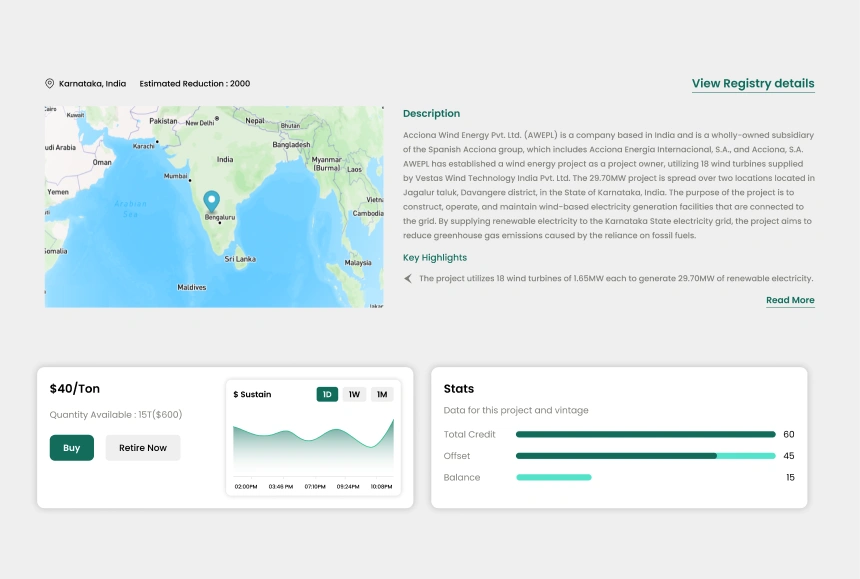
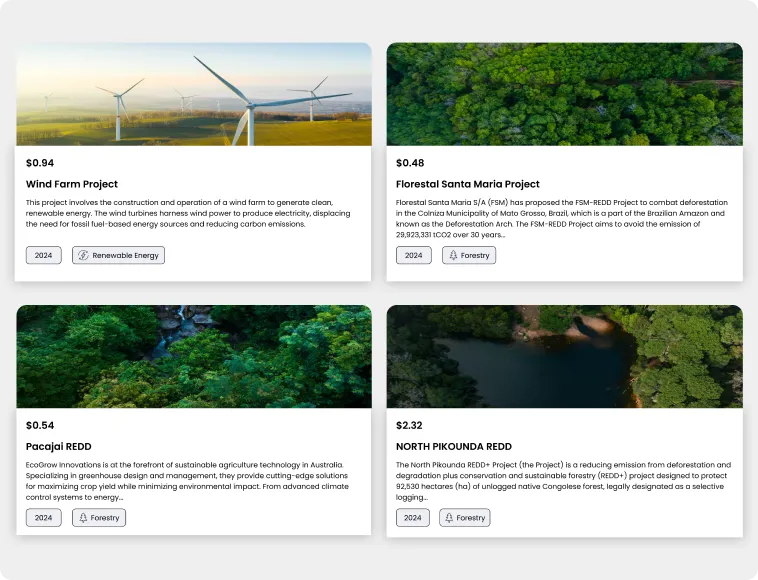
Users can unlock new opportunities for carbon offsetting, investment, and collaboration. This platform offers a convenient and transparent solution for engaging in the carbon credit market.
The Carbon Credit Calculator allows users to input data related to their activities, such as energy consumption, transportation habits, and waste generation. Based on this input, the calculator calculates their carbon footprint, typically measured in metric tons of carbon dioxide equivalent (CO2e).
By Steps:
- Input Data: This may include information about their electricity usage, fuel consumption for vehicles etc.
- Calculate Carbon Footprint : Once the data is entered, the calculator processes this information using algorithms to compute the user's carbon footprint.
- Explore Offset Options: Users can explore options for offsetting emissions through carbon credits or other mitigation measures
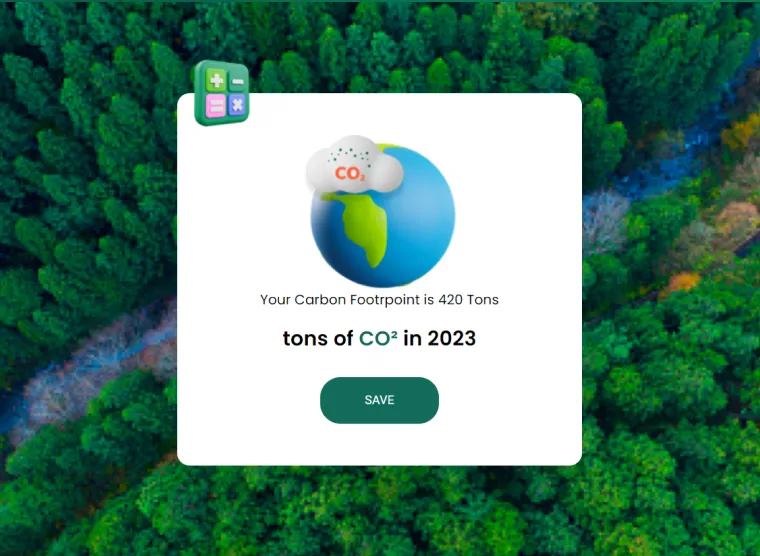
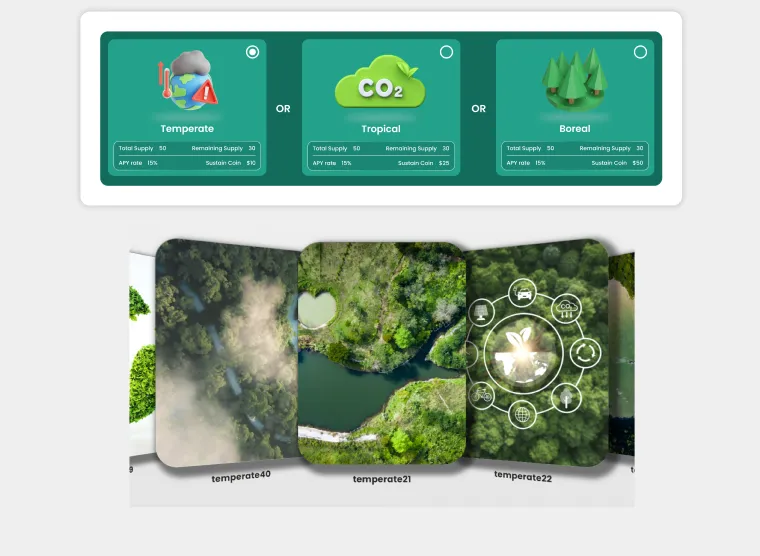
Users can stake their NFTs within the platform by locking them into a smart contract for a specified period. Feature in this Carbon Credit Marketplace App includes three pools where users can stake their non-fungible tokens (NFTs) and receive rewards based on their staking activity.
- Platform owner
As the Marketplace owner, they can hold the reins of this platform, overseeing its operations and setting the tone for carbon credit trading.
- Project Owner
Project owners can publish their projects in the Marketplace, they can gain visibility, attract potential investors, and contribute to global efforts to combat climate change.
- Platform Users
Users Can log in and calculate their carbon credit after calculating they can offset by exchange sustain coin.
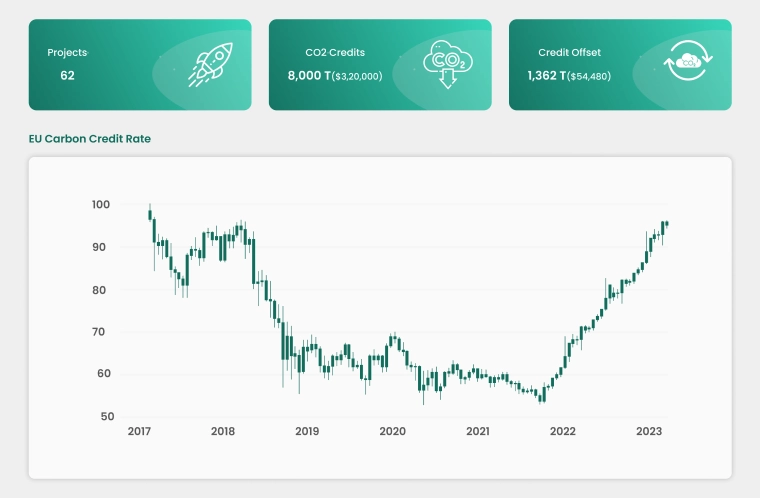
Have Questions? We’re Here to Help!
Curious about our case studies? Contact us and we’ll walk you through the results we’ve delivered and how we can help your carbon credit platform thrive.
Top 6 Carbon Credit Exchanges Globally
Here is the list of top 6 Projects to watch out
AirCarbon offers a transparent and liquid platform for trading both voluntary and compliance-grade credits. This empowers businesses to seamlessly engage in carbon offsetting, fostering a more accessible and efficient carbon market.
Toucan Protocol makes it easy for people to trade carbon credits. With Toucan Protocol, you can buy and sell credits that help offset carbon emissions. It's a simple way to do your part for the environment while also supporting businesses.
Xpansive carbon credit exchanges provide a hassle-free platform for trading carbon credits. With Xpansive, you can easily buy and sell credits that help reduce carbon emissions.
Carbon Trade Exchange offers a simple way to trade carbon credits. Whether you're buying or selling, Carbon Trade Exchange makes it easy to be a part of reducing carbon emissions .
At Texas Climate and Carbon Exchange, facilitate seamless trading of carbon credits, empowering individuals and businesses to contribute to a cleaner environment .
Carbon Expert Romania specialize in carbon credit trading, helping businesses navigate the complexities of carbon offset markets.
Leading Multinational Corporations Purchasing Carbon Credits
Microsoft
Microsoft has committed to being carbon negative by 2030, meaning it will remove more carbon from the atmosphere than it emits. The company has already reduced its carbon emissions by 21% since 2013.
Apple has committed to being 100% carbon neutral for its supply chain and products by 2030. The company has already reduced its carbon emissions by 40% since 2015.
Amazon has committed to being net zero carbon by 2040, a decade ahead of the Paris Agreement goal. The company has already purchased 100,000 electric delivery vehicles and has invested in renewable energy projects to power its operations.
Alphabet has committed to operating on 24/7 carbon-free energy in all its data centers and campuses worldwide by 2030. The company has already reduced its carbon emissions by 50% since 2005.
Ford has committed to becoming carbon neutral by 2050. The company has already reduced its carbon emissions by 37% since 2017 and has invested in electric vehicle production and renewable energy projects.
Why Choose Blockchain Technologies for Carbon Credit Marketplace Platform Development?
At Blockchain Technologies we provide best Carbon Credit Trading Marketplace Platform Development, choosing us ensures cutting-edge innovation and expertise in creating a secure, transparent, and efficient carbon credit marketplace. Our team’s deep understanding of Blockchain’s decentralized nature guarantees a tamper-proof system for tracking and trading carbon credits. You are selecting a partner dedicated to driving positive change through innovative technology, fostering a greener future for businesses and the planet.
Frequently Asked Questions
Find answers to common queries about Blockchain Technologies.
A Carbon Credit Trading Marketplace is an online platform that enables the buying and selling of carbon credits—tradeable certificates that allow the holder to emit one ton of carbon dioxide or other greenhouse gases. Buyers use these to offset emissions, while sellers are typically projects that reduce or remove emissions.
The cost can range from $20,000 to $200,000 or more depending on the app’s complexity, platforms (iOS, Android, web), features, customization level, and developer rates.
Development time varies from 3–6 months for a basic app to 12–18 months for a complex platform with advanced features and integrations.
Several firms specialize in this area, but Blockchain Technologies stands out by offering tailored marketplace development services customized to client requirements.
Yes, individuals can buy carbon credits to offset their personal carbon footprint or support eco-friendly environmental initiatives.
Carbon credits are mainly purchased by companies and governments to comply with regulatory requirements or voluntary commitments to reduce emissions.
Blockchain Technologies offers industry-leading services with over 100 blockchain products delivered globally. Rated by Top Developers, we are your trusted partner in carbon trading platform development.
Companies, governments, and individuals can buy and sell carbon credits to offset emissions or monetize environmental projects that reduce carbon output.
Look for developers with proven experience, blockchain expertise, security-first development, ability to customize, strong support, and cost-effective services. Blockchain Technologies excels in all these areas—schedule a meeting today!
Yes. At Blockchain Technologies, we offer full post-deployment support including updates, bug fixes, enhancements, and ongoing technical assistance to ensure your platform stays reliable and secure.
Blogs
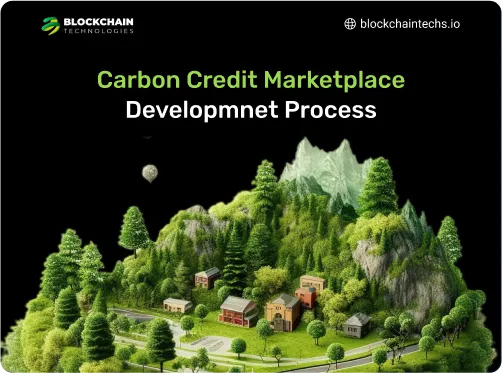
Carbon Credit Marketplace Development Process
How To Buy Carbon Credits - A Detailed Guide Feb 2025 blockchaintechs.io How to by Carbon Credits -...
Read More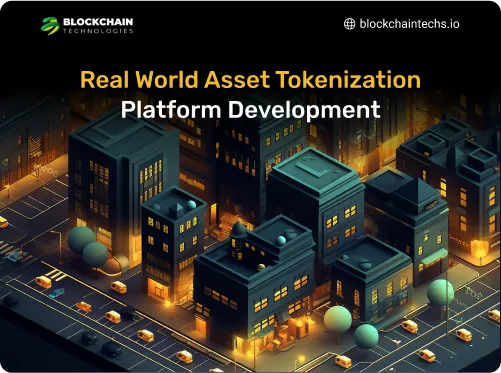
Real World Asset Tokenization Platform Development
RWA Tokenization Projects in 2025 Feb 8 2025 blockchaintechs.io RWA Tokenization - Projects in 2025...
Read More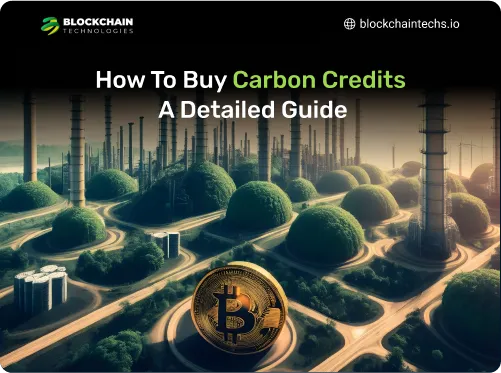
How to buy Carbon Credits - A Detailed Guide
How To Buy Carbon Credits - A Detailed Guide Feb 2025 blockchaintechs.io How to by Carbon Credits -...
Read MoreConnect With Us
Send us your requirements and our team will get back to you shortly
Our Locations
Sydney
MLC Centre, 19-29 Martin Place,
Sydney, Australia 2000
Perth
56 Palmerston St, Perth-WA,
Australia 6000
Dubai
Binary Tower, 20th Floor, Office 96,
Business Bay, Dubai, UAE
Melbourne
14 Mason Street, Melbourne,
VIC, Australia 3175
Chennai, India
Level 7, 143, MGR Main Rd, Perungudi,
Chennai, India 600096
Brisbane
80 Ann, Brisbane, QLD,
Australia 4000
Sydney
MLC Centre, 19-29 Martin Place,
Sydney, Australia 2000
Perth
56 Palmerston St, Perth-WA,
Australia 6000
Dubai
Binary Tower, 20th Floor, Office 96,
Business Bay, Dubai, UAE
Melbourne
14 Mason Street, Melbourne,
VIC, Australia 3175
Chennai, India
Level 7, 143, MGR Main Rd, Perungudi,
Chennai, India 600096
Brisbane
80 Ann, Brisbane, QLD,
Australia 4000


